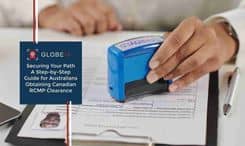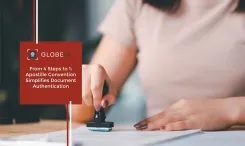State Apostille Services from USA
Apostille Services in California
Apostille Services in Texas
Apostille Services in Florida
Apostille Services in Washington
Services from Canada
Services from United Kingdom
Services from New Zealand

What is an Apostille Stamp? UK Apostille Process Explained
Legalisation is important in validating the authenticity of your documents, especially when you plan to use them in a country other than their country of origin. Apostille is an international document legalisation procedure performed under the Hague Convention of 1961, of which the UK is also a signatory. It validates the signature or seal of a UK public official on the document, making it acceptable for use in over 100 member countries of the Convention.

Why legalisation of Your UK-based Documents Is Required
Imagine you're a Brit planning to study in Germany, or perhaps a business owner wanting to set up shop in Spain. In both of these scenarios, you will find yourself dealing with government agencies outside the UK. These foreign offices will require proof that your UK-issued documents, such as educational certificates or business paperwork, are genuine. This is where the apostille of your documents comes into the picture.
The apostille certificate plays a pivotal role in the process of document legalisation. It serves as a bridge between the UK and the authorities in your destination country. Your document with an apostille stamp carries a mark of credibility that is recognized worldwide. It acts as proof to foreign officials that your document has undergone the verification procedures as outlined by the Hague Convention.
Documents that can be legalized from the UK
Not all of your documents need to be apostilled. Moreover, certain document types need to fulfill specific criteria before they can be accepted for an apostille stamp. We have compiled a brief introduction of these categories below for your convenience. Their specific requirements will also follow in the later sections of the blog.Court-Sealed Documents
Court-sealed documents are among the most commonly apostilled documents in the UK. These include court orders, decrees, judgments, and other legal paperwork issued by a court of law. You will need to get an apostille verification of the seal or signature of the UK court official on these documents.
Public Registry Certificates
Certificates from public registries, such as the General Register Office (GRO) or the local registry offices in your specific part of the UK also require an apostille. Birth certificates, marriage certificates, death certificates, and adoption certificates are some of the common examples. You will most likely need to submit these documents in your destination country for reasons ranging from immigration procedures to marriage registration.
Government-Issued Documents
Documents issued by the Government of the UK or its departments can also be legalized for international use. This includes documents like criminal record checks (police clearance certificates), single status certificates, HMRC letters, and documents from the Department for Education.
Certified Documents from UK Public Officials
Documents that have been certified by UK public officials, such as solicitors or notary publics, are also eligible for legalisation. This could include powers of attorney, affidavits, sworn statements, or other documents bearing the signature or seal of a UK public official.
Academic and Professional Qualifications
These are degrees, diplomas, certificates, and other educational qualifications issued by educational institutions in the UK. Similarly, professional qualifications and memberships are also included. Do check to see if you need to get a notary certification on these documents before they can be sent in for the UK Apostille service.
Corporate Documents
You will need to apostille your corporate documents if you are looking to expand or relocate your business abroad. At Globeia, we have helped our clients apostille their business documents as articles of association, incorporation certificates, financial records, and power of attorney documents. Notary certification is often required for this category of documents as well.

UK Apostille Requirements
As mentioned earlier, these document categories also have some prerequisites that must be completed before starting their apostille process. Here is a summary of these apostille requirements:
- The document must be an original UK document. Copies are accepted only if they bear a notary certification seal on them.
- Documents from the General Register Office, such as birth, death, marriage, civil partnership, and adoption certificates do not require notary certification.
- Academic degrees and professional qualification certificates need to be certified before being apostilled. You will need to prove that your certificates are accurate.
- Business documents like letters of association and incorporation are often certified when they are issued. So, they may not need any additional procedures before the apostille.

Types of Apostille: Paper-based and e-Apostille
You must have noticed that there are types of apostille options when legalizing your UK documents for international use. These are Paper-based and e-Apostilles. Let’s discuss both of these in detail so that you can decide the best option for you.
Paper-based Apostille
As the name suggests, a paper-based apostille involves getting a physical stamp or seal affixed to your documents. This is a traditional apostille form and also the most commonly used option. The apostille will be attached to the original or verified copy of your documents such as birth certificates, final order (decree absolute) certificates, marriage certificates, educational certificates, and more.
You can apply for a paper-based apostille by sending your original documents via post to the UK Foreign & Commonwealth Office’s Department of legalisation. They will verify your documents by attaching an apostille to them.e-Apostille
e-Apostilles, on the other hand, are a digital alternative to the traditional form of apostille. This option was introduced in 2022 to make the document legalisation process more efficient and faster. An electronic certificate is issued to verify the authenticity of a digital or scanned document, instead of a physical stamp or seal.
You will have to upload your digital documents or scan your physical documents and upload the file to legalisation Office’s online platform. An e-Apostille is issued and emailed to you after the Office performs its verification process. You can use the e-Apostille in any of the Hague member countries without any issues.When to Use Each Type
The choice between a paper-based apostille and an e-apostille usually depends on the nature of your documents and the requirements of the country where they will be used.
Paper-based apostilles are generally preferred for official documents that are already in paper form, such as birth and marriage certificates because scanned copies come with their own share of issues. Paper-based apostille is also a mandatory requirement in countries that haven't fully transitioned to digital document processing yet.Meanwhile, e-Apostilles are ideal for documents that are already in a digital format. This option is also preferred when applicants are short on time. Most countries accept digital documents, so you can use this faster option after confirming with the relevant authorities.Processing Time and Receiving Legalized Documents
Processing Times
The processing time can vary depending on factors such as the volume of apostille requests received by the UK Legalisation Office, the type of document and the application method.
The standard processing time for paper-based apostilles is approximately 1-2 weeks. This may increase if your document requires notarization or the Office of legalisation has some questions for you.E-Apostilles typically have a faster turnaround time, since they use a digital process. You can expect to receive the e-Apostille within a few days of uploading your documents onto the UK Legalisation Office's online application management system. This makes the e-Apostille a great option if you need your documents legalized quickly.
The Legalisation Office Notification
You will receive a notification from the FCDO once your documents have been successfully legalized. Paper-based apostille applicants usually receive a notification via email or phone. The notifications for e-Apostille applications, on the other hand, are email-based. You will receive the instructions to download your digital apostille in the notification email.
Receiving Legalized Documents
If you applied for a paper-based apostille, your original documents along with the apostille can be returned to you via post. Alternatively, you can also opt for the postage option if you want to receive the documents in the UK. This would require an A4 envelope and postage stamps according to your address.
The process for receiving the e-apostille is even simpler. You can download your digital apostille certificate directly from the FCDO notification email, as discussed in the last section.

Rejected Documents and Refunds
Even though the rejection rates for UK Apostille requests are very low, there might still be instances when your documents get rejected for some reason. There is nothing to worry about though. We understand this can be pretty confusing, so the Globeia apostille service team has prepared this section to help you in case your apostille gets rejected.
Document Rejection During Legalisation
The UK Legalisation Office reviews your documents to ensure that they are authentic and meet all the necessary Hague Convention rules. There can sometimes be mistakes or omissions in the application process which lead to rejection. Some of the commonly seen reasons at the Globeia office are missing signatures, incorrect application filling and copies of documents that are not notarized.
You will receive a notification from the legalisation office in case this happens. The notification will detail the reason for the rejection so that you can fix the issue and reapply.
Refund Policy for Rejected Documents
You will receive an automatic refund from the FCDO in case your documents are rejected during the legalisation process. The refund will be issued according to your chosen method of payment at the time of application.
The refund policy only covers the legalisation fee. Additional costs such as courier fees and notarial fees are not included in the FCDO’s regulations. This is why we help all of our clients at Globeia ensure that their documents meet all the necessary requirements before we submit them for apostille.
No Refunds for Recipient Rejected Documents
The Legalisation Office’s refund policy does not apply if the apostilled document is rejected by the foreign country’s department where you intend to use it. While it is very rare, some foreign governments, educational institutions, and businesses may reject your legalized documents. Unfortunately, you will not receive a refund in this case and will have to apply again.
The reason for this is that the apostille verifies the authenticity of the UK public official's signature, stamp, or seal on the document and not its content. Foreign recipient rejections are usually because of the document content.
Conclusion
The Globeia apostille service team is known for being very detailed in checking to see if there are any additional steps required before you can submit your apostille request in the UK. This helps you save money and time by minimizing the risk of rejection.
Feel free to add your details to the form below to get started. A Globeia representative will look at your details and get back to you asap.









Global Services
State Services